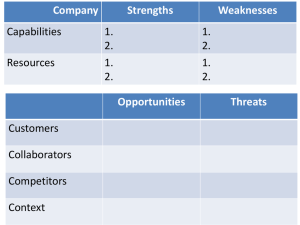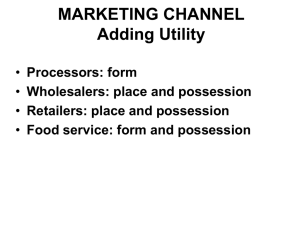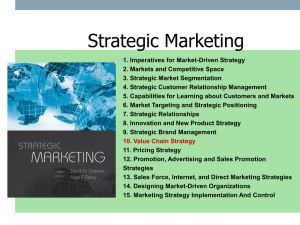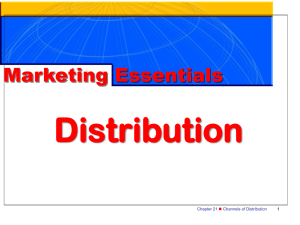Specific Objectives
advertisement
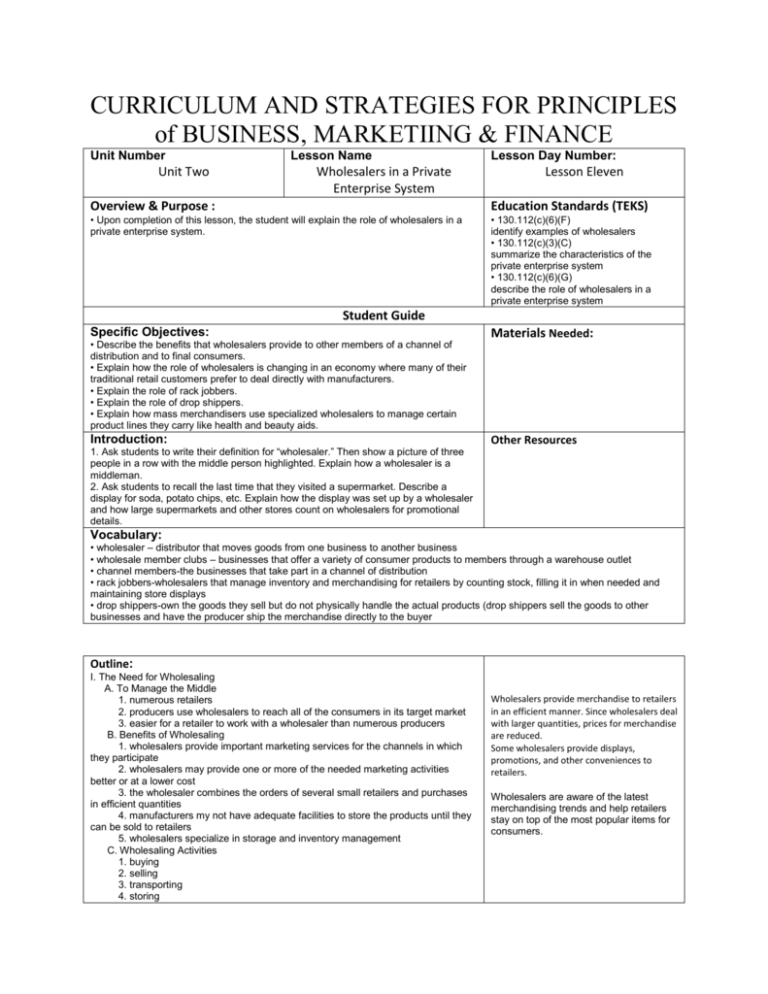
CURRICULUM AND STRATEGIES FOR PRINCIPLES of BUSINESS, MARKETIING & FINANCE Unit Number Unit Two Lesson Name Wholesalers in a Private Enterprise System Lesson Day Number: Lesson Eleven Overview & Purpose : Education Standards (TEKS) • Upon completion of this lesson, the student will explain the role of wholesalers in a private enterprise system. • 130.112(c)(6)(F) identify examples of wholesalers • 130.112(c)(3)(C) summarize the characteristics of the private enterprise system • 130.112(c)(6)(G) describe the role of wholesalers in a private enterprise system Student Guide Specific Objectives: • Describe the benefits that wholesalers provide to other members of a channel of distribution and to final consumers. • Explain how the role of wholesalers is changing in an economy where many of their traditional retail customers prefer to deal directly with manufacturers. • Explain the role of rack jobbers. • Explain the role of drop shippers. • Explain how mass merchandisers use specialized wholesalers to manage certain product lines they carry like health and beauty aids. Introduction: 1. Ask students to write their definition for “wholesaler.” Then show a picture of three people in a row with the middle person highlighted. Explain how a wholesaler is a middleman. 2. Ask students to recall the last time that they visited a supermarket. Describe a display for soda, potato chips, etc. Explain how the display was set up by a wholesaler and how large supermarkets and other stores count on wholesalers for promotional details. Materials Needed: Other Resources Vocabulary: • wholesaler – distributor that moves goods from one business to another business • wholesale member clubs – businesses that offer a variety of consumer products to members through a warehouse outlet • channel members-the businesses that take part in a channel of distribution • rack jobbers-wholesalers that manage inventory and merchandising for retailers by counting stock, filling it in when needed and maintaining store displays • drop shippers-own the goods they sell but do not physically handle the actual products (drop shippers sell the goods to other businesses and have the producer ship the merchandise directly to the buyer Outline: I. The Need for Wholesaling A. To Manage the Middle 1. numerous retailers 2. producers use wholesalers to reach all of the consumers in its target market 3. easier for a retailer to work with a wholesaler than numerous producers B. Benefits of Wholesaling 1. wholesalers provide important marketing services for the channels in which they participate 2. wholesalers may provide one or more of the needed marketing activities better or at a lower cost 3. the wholesaler combines the orders of several small retailers and purchases in efficient quantities 4. manufacturers my not have adequate facilities to store the products until they can be sold to retailers 5. wholesalers specialize in storage and inventory management C. Wholesaling Activities 1. buying 2. selling 3. transporting 4. storing Wholesalers provide merchandise to retailers in an efficient manner. Since wholesalers deal with larger quantities, prices for merchandise are reduced. Some wholesalers provide displays, promotions, and other conveniences to retailers. Wholesalers are aware of the latest merchandising trends and help retailers stay on top of the most popular items for consumers. 5. financing 6. accumulating products of many manufacturers, developing appropriate assortments for their customers, and distributing the products to their customers 7. assisting manufacturers in determining needs of retailers and final consumers and providing market information to retailers 8. collecting and analyzing information on sales, costs, changes in demand, and inventory levels 9. purchasing products from producers and manufacturers and selling them to their customers 10. assuming risk by investing money in products that may be damaged or destroyed D. Types of Wholesalers 1. full-service wholesalers a. take title to the products they sell b. provide a full range of distribution activities c. provide or arrange transportation services d. offer credit e. provide promotion assistance, product research, information, product installation and repair 2. limited-service wholesalers a. may not provide services such as research, credit, or promotional support b. concentrate on one or two important functions such as warehousing and storage, product delivery, or accumulating products for sale in a convenient location 3. agents and brokers a. independent businesses b. provide specialized exchange functions such as locating suppliers, selling, financing, or arranging shipments c. do not take title to products d. work as an extension of the workforce of the manufacturer or retailer E. Other Wholesaling Businesses 1. wholesale franchises and cooperatives-groups of small businesses that affiliate because of the benefit gained from cooperation in completing marketing and distribution activities a. IGA, FTD, Ace Hardware – examples b. members gain benefits from purchasing larger quantities 2. Wholesale member clubs-businesses that offer a variety of consumer products to members through a warehouse outlet a. open to final consumers and businesses b. Sam’s Club and Costco c. products displayed in large warehouses d. limited product assortments are available in large quantities e. customers must transport their purchased products F. Changing Role of Wholesalers 1. large retailer may prefer working directly with producers 2. more small- and medium-sized retailers and manufacturers than there are large businesses 3. access to markets a. product awareness b. export and import organization-important in building international business c. better communications and information, improved technology, broader customer service d. work to identify their customers and understand their needs e. learn of the problems the customers are having with products and marketing activities and help them to solve those problems G. Specialized services 1. marketing research and marketing information services 2. provide customers with important data 3. computer technology to process orders quickly 4. new methods for storing and handling products to reduce product damage, the cost of distribution, and the time needed to get products from the manufacturer to the customers 5. adding customer services-marketing and promotional planning, 24-hour ordering and emergency deliveries, specialized storage facilities, and individualized branding and packaging services Looking Forward: Q: What is a rack jobber? A: A rack jobber maintains the inventory for a store. Q: Do wholesalers work with final consumers in any significant way? Many wholesalers extend credit to retailers. They also have insurance to cover any possible damages to merchandise. Limited-service wholesalers may act as a storage facility until the retailer needs the merchandise. A convenient location may allow the wholesaler to make efficient deliveries when merchandise is needed by the retailer. Some independent agents are hired by retailers to locate merchandise and provide smaller quantities when needed by retailers. Agents and brokers may work as representatives for manufacturers. When businesses form together as cooperatives, they have the advantages of buying power, promotion, distribution, and advertising. Sam’s Club and Costco are examples of clubs (organizations) that provide members with the benefit of lower prices. Some large businesses prefer to work directly with manufacturers. Cutting out the middle man saves companies money. Wholesalers are increasing the services they offer to retailers. One of the biggest benefits offered by wholesalers is research and marketing information services. Emergency ordering and delivery are important benefits provided by today’s wholesalers. A: They do not work with final consumers in any significant way; their role is to provide needed marketing functions between producers and businesses. Q: How is a full-service wholesaler different from a limited-service wholesaler? A: The full-service wholesaler takes title to the products they sell and provide a full range of distribution activities. The limited-service (specialized) wholesalers may not provide services such as research, credit, or promotional support; they concentrate on one or two important functions such as warehousing and storage, product delivery, or accumulating products for sale in a convenient location such as a produce or fresh fish market for supermarkets. Q: What are wholesale member clubs? A: Wholesale member clubs are businesses that offer a variety of consumer products to members through a warehouse outlet. Q: What types of benefits does a wholesaler provide to other members of a distribution channel? A: Wholesalers are companies that assist with distribution activities between businesses. They provide marketing services and typical wholesaling activities include buying, selling, transporting, storing, and financing. They accumulate the products of many manufacturers, develop appropriate assortments for their customers, and distribute the products to them. Q: What happens to the costs of distribution activities when a wholesaler is used to complete them? A: The costs of the activities are lower when a wholesaler is used. Q: Why have the number of wholesalers not decreased due to consolidation of businesses? A: Wholesalers are still highly demanded by small- and medium-sized businesses. There are more small- and medium-sized businesses and manufacturers than large operations. FUN FACTS DISPLAYED According to the 2002 U.S. Economic Census report, 435,521 U.S. wholesalers generated sales of more than $4.6 trillion dollars. At the same time, 1.1 million retail businesses reported total U.S. sales of just under $3.1 trillion. Wholesalers generated one-fifth of their total sales in foreign markets. Ask students to display this information in a visual format that is easy to comprehend.


